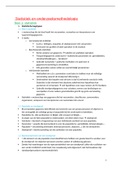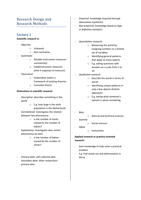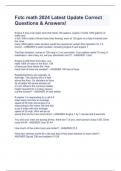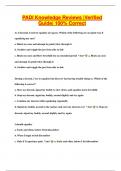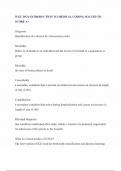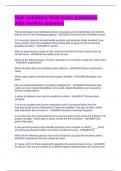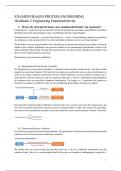Individuals to society, Heather.
Trait theories – the big five – EXAM!!
Important – problems with intelligence testing, exam? Biases in intelligence testing, gender
and cultural biases
Important to know difference between trait and type theories
Big five – what is it? How does it work? Central factors? Critiques?
Important - different perspectives of explaining personality
Important – nature and nurture, seminar information for personality, biological and
environment, biological vs psychological theories of personality– EXAM!!
Types vs traits: personality tests either look at types or traits, types – group into categories
dependent on behaviour, trait – different levels of expression of a particular characteristics,
continuum.
Type approach: either one of the other, going to concentrate of trait approach.
Type A and B: originally measured on a scale of responses to a personality questionnaire,
type a – high on competitiveness, self critical, strive towards goals with feeling of
achievement rather than enjoyment, sense of urgency with time, stressed, easily aroused to
things related to aggression. Type b – not feeling stress, time constraints or pressures.
Importance of type a or b findings – particularly related to heart disease and other health
related issues, type may affect coping strategies and thus recovery, type b – acceptance
based coping, let things happen and unfold without intervention, type a – knowledge
seeking.
Type c: ?? Brief
But: there are real differences between type a and type b however there are other types of
people who do not fall into either discrete category.
Trait theory assumption: suggests personality is composed of dispositions and allows for
individual differences in personality. Good at predicting behaviours as suggests it is stable
over time and situations.
Lexical hypothesis: ..
Allport: words to describe personality traits and characteristics. Trait theory aimed to apply
all these words to individuals to describe them, become synonymous with qualities of the
words. Central traits – general, secondary traits – related to attitudes and preferences, may
change across time and situations and mood, Cardinal traits – integral to person.
Allport important??
Cattell - ..
, Eysenck, super traits: narrowed it down either further, extra version, neuroticism,
psychoticism. Biological component.
Pen model: ?
Psychopathy: ted bundy,why do some develop this type of personality? Interaction between
three main factors, biological dysfunctions – brain trauma, injury, genetic disposition,
sociopsychological traumas.
Criminal psychopaths: ..
Traits: dark triad, often studied using twin studies to see if there is a genetic link in
psychopathy.
The big five: - EXAM!! Cattell 16 too many, Eysenck three not enough, big five came forward
to give a more sound and clear distinction of personality traits.
Five factor model: do draw upon previous models, e.g. Extra version and neuroticism.
Personality test: …
Application: neuroticism – self protecting behaviours. Way that people form attachments
may be linked to the personality traits they later go on to develop, not as powerful as
original attachment styles.
Evaluating: EXAM!! More detail, describe trait theories and advantages/disadvantages.
Women more agreeable, men more neurotic, men less extroverted, men less assertive,
women become more dominant etc…from that specific research.
Use personality tests in recruitment as a psychometric test.
Important: big five and evaluations of approaches, differences between type and trait.
Intelligence
Galton: …
Binet: ….
Terman:…
IQ: iq and intelligence often used synonymously. Average 85-115.
Spearman: …
Measuring iq, WAIS: verbal – cognitively based measures, two contracts that have been
theoretically linked to verbal iq. Working memory – memory with tasks we are currently
engaged with.
Ravens: based on general intelligence abilities. Culturally unbiased tests of intelligence as it
doesn't rely on language.
Cattell: crystallised – difficult to avoid cultural bias as it is based on experiences. Fluid is less
susceptible to cultural bias.
Gardner: …
2
Trait theories – the big five – EXAM!!
Important – problems with intelligence testing, exam? Biases in intelligence testing, gender
and cultural biases
Important to know difference between trait and type theories
Big five – what is it? How does it work? Central factors? Critiques?
Important - different perspectives of explaining personality
Important – nature and nurture, seminar information for personality, biological and
environment, biological vs psychological theories of personality– EXAM!!
Types vs traits: personality tests either look at types or traits, types – group into categories
dependent on behaviour, trait – different levels of expression of a particular characteristics,
continuum.
Type approach: either one of the other, going to concentrate of trait approach.
Type A and B: originally measured on a scale of responses to a personality questionnaire,
type a – high on competitiveness, self critical, strive towards goals with feeling of
achievement rather than enjoyment, sense of urgency with time, stressed, easily aroused to
things related to aggression. Type b – not feeling stress, time constraints or pressures.
Importance of type a or b findings – particularly related to heart disease and other health
related issues, type may affect coping strategies and thus recovery, type b – acceptance
based coping, let things happen and unfold without intervention, type a – knowledge
seeking.
Type c: ?? Brief
But: there are real differences between type a and type b however there are other types of
people who do not fall into either discrete category.
Trait theory assumption: suggests personality is composed of dispositions and allows for
individual differences in personality. Good at predicting behaviours as suggests it is stable
over time and situations.
Lexical hypothesis: ..
Allport: words to describe personality traits and characteristics. Trait theory aimed to apply
all these words to individuals to describe them, become synonymous with qualities of the
words. Central traits – general, secondary traits – related to attitudes and preferences, may
change across time and situations and mood, Cardinal traits – integral to person.
Allport important??
Cattell - ..
, Eysenck, super traits: narrowed it down either further, extra version, neuroticism,
psychoticism. Biological component.
Pen model: ?
Psychopathy: ted bundy,why do some develop this type of personality? Interaction between
three main factors, biological dysfunctions – brain trauma, injury, genetic disposition,
sociopsychological traumas.
Criminal psychopaths: ..
Traits: dark triad, often studied using twin studies to see if there is a genetic link in
psychopathy.
The big five: - EXAM!! Cattell 16 too many, Eysenck three not enough, big five came forward
to give a more sound and clear distinction of personality traits.
Five factor model: do draw upon previous models, e.g. Extra version and neuroticism.
Personality test: …
Application: neuroticism – self protecting behaviours. Way that people form attachments
may be linked to the personality traits they later go on to develop, not as powerful as
original attachment styles.
Evaluating: EXAM!! More detail, describe trait theories and advantages/disadvantages.
Women more agreeable, men more neurotic, men less extroverted, men less assertive,
women become more dominant etc…from that specific research.
Use personality tests in recruitment as a psychometric test.
Important: big five and evaluations of approaches, differences between type and trait.
Intelligence
Galton: …
Binet: ….
Terman:…
IQ: iq and intelligence often used synonymously. Average 85-115.
Spearman: …
Measuring iq, WAIS: verbal – cognitively based measures, two contracts that have been
theoretically linked to verbal iq. Working memory – memory with tasks we are currently
engaged with.
Ravens: based on general intelligence abilities. Culturally unbiased tests of intelligence as it
doesn't rely on language.
Cattell: crystallised – difficult to avoid cultural bias as it is based on experiences. Fluid is less
susceptible to cultural bias.
Gardner: …
2

